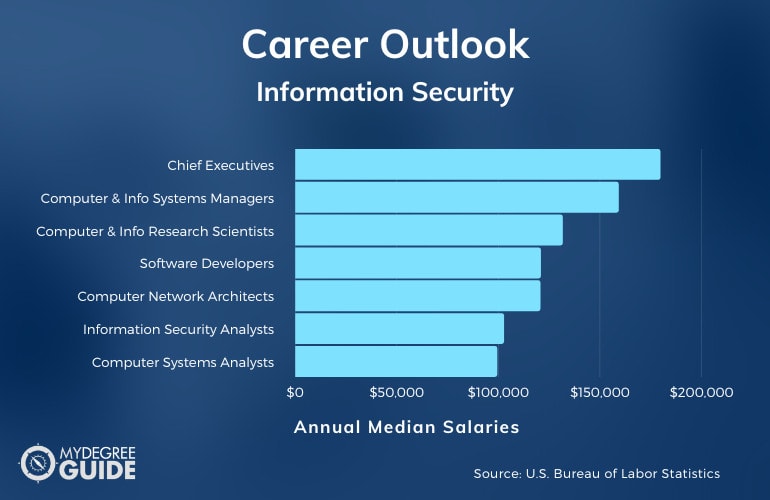A masters in information security can prepare you for a number of advanced career opportunities in this growing sector. Information systems security specialists are the protectors and defenders of data.

The amount of data stored on computer networks and online is enormous. From individuals’ personal details to classified government intelligence, protecting sensitive information is both a crucial and daunting task.
Editorial Listing ShortCode:
Earning a master’s in information systems security can help you develop the expertise necessary for protecting the integrity of information and preventing unauthorized access.
Universities Offering Online Masters in Information Security Degree Program
Methodology: The following school list is in alphabetical order. To be included, a college or university must be regionally accredited and offer degree programs online or in a hybrid format.
Augusta University
Augusta University offers a Master of Science in Information Security Management. The program is 100% online and includes 30 credit hours of coursework. Students in the program must take six required courses and four electives. The curriculum is designed around the requirements for the CISSP certification. GRE scores are not needed to apply.
Augusta University is accredited by the Southern Association of Colleges and Schools Commission on Colleges.
Bellevue University
Bellevue University offers a Master of Business Administration with a concentration in Information Security Management. The program is available both on campus and online. To graduate, students must complete 36 credit hours of coursework. The admissions process is simple and does not require GRE or GMAT scores.
Bellevue University is accredited by the Higher Learning Commission.
Brandeis University
Brandeis University offers an online program for a Master of Science in Information Security Leadership. The degree can potentially be finished in 3 years. Students may complete the degree with a part-time schedule. To graduate, students must complete 30 credits. Course options include Foundations of Information Security, Information Security Management, Principles of Computer Incident Response and Investigation, and more.
Brandeis University is accredited by the New England Commission of Higher Education.
Capella University
Capella University offers a Master of Science in Information Assurance and Cybersecurity. Students can choose from three specializations: Digital Forensics, Health Care Security, or Network Defense. The program includes virtual labs to provide hands-on experience and offers opportunities to qualify for certifications from SAS, Cisco, and CompTIA.
Capella University is accredited by the Higher Learning Commission.
Champlain College
Champlain College’s MS in Information Security is available 100% online. Depending on their career goals, students can choose between an Operations track or a Management track. This program is designed for students who already have 2 years of relevant work experience. Champlain has been recognized by the DHS and the NSA.
Champlain College is accredited by the New England Commission of Higher Education.
Davenport University
Davenport University offers a Master of Science in Information Security – Cybersecurity. No GRE scores and no previous background in the field are required to apply. The program requires the completion of 34 credits. Course options include Information Security Planning, Applied Cryptography, Advanced Computer Forensics, Analytical Statistics for Management, and more.
Davenport University is accredited by the Higher Learning Commission.
Florida Institute of Technology
The Florida Institute of Technology offers an MS in Information Assurance and Cybersecurity. The degree can be earned on campus or online. The program’s interdisciplinary curriculum draws on technology, business, and engineering. Its online classes are interactive, have low student-to-teacher ratios, and are taught by faculty members with industry experience.
Florida Institute of Technology is accredited by the Southern Association of Colleges and Schools Commission on Colleges.
Fort Hays State University
Fort Hays State University offers a Master of Professional Studies in Information Assurance Management. All courses are available both on campus and online. Course options include Research Methods in Informatics, Foundations of Information Systems Security, Seminar in Informatics: Web Security, Information Risk Management, and more.
FHSU is accredited by the Higher Learning Commission.
Jacksonville State University
Jacksonville State University offers a Master of Science in Computer Systems and Software Design – Information Security and Assurance. Students in the program must take six required courses and can then choose from numerous elective options. Prospective students can apply to begin in fall or spring. Applicants are asked to provide transcripts, GRE test scores, and references.
Jacksonville State University is accredited by the Southern Association of Colleges and Schools Commission on Colleges.
James Madison University
James Madison University’s online MS in Computer Science: Information Security program is intended for working professionals.
The program includes virtual labs and studies in state-of-the-art technology. Class sizes are kept small to help students receive one-on-one attention and are taught by instructors with industry experience. JMU has been recognized by the National Security Agency and the Department of Homeland Security.
James Madison University is accredited by the Southern Association of Colleges and Schools Commission on Colleges.
Johnson & Wales University
Johnson & Wales University offers a Master of Business Administration in Information Security and Assurance. Courses are 8 weeks long and available 100% online. The degree can typically be finished in 2 years. Courses options include Foundations of Information Security Management, Cyber Science and IT Business Operations, Risk Management and Incident Response, and more.
JWU is accredited by the New England Commission of Higher Education.
Northwestern University
Northwestern University’s Master of Science in Information Systems can be earned with a specialization in Information Systems Security.
The program aims to help students develop technological and administrative knowledge. Coursework includes Management of Information Security, Business Continuity and Disaster Recovery, Project Management Concepts, and Fundamentals of Network Security. Students in the program also have elective options.
Northwestern University is accredited by the Higher Learning Commission.
Pennsylvania State University
Pennsylvania State University offers a Master of Professional Studies in Homeland Security – Information Security and Forensics. Graduates often pursue work in fields such as digital forensics and risk analysis. The program requires the completion of 33 credit hours. The coursework is the same whether the degree is earned online or on campus.
The Pennsylvania State University is accredited by the Middle States Commission on Higher Education.
Sam Houston State University
Sam Houston State University offers an online program for a Master of Science in Information Assurance and Cybersecurity. The program is intended for students with bachelor’s degrees in computer science or related fields. New students may begin in fall, spring, or summer semesters. To graduate, students must complete 30 credit hours.
Sam Houston State University is accredited by the Southern Association of Colleges and Schools Commission on Colleges.
Strayer University
Strayer University offers an online program for a Master of Science in Information Security and Assurance. The program consists of ten 11 week courses. Students typically take 1 to 3 courses at a time. Courses include Advanced Computer Architecture, Advanced Network Security Design, Security Access and Control Strategies, and Computer Forensics Planning. The curriculum also includes labs that simulate actual cyberthreats.
Strayer University is accredited by the Middle States Commission on Higher Education.
Towson University
Towson University offers an MS in Applied Information Technology. Towson uses a rolling admissions process and prospective students may apply for fall, spring, or summer terms. Students without backgrounds in programming may still apply, but they may need to take prerequisite coursework their first semester.
Towson University is accredited by the Middle States Commission on Higher Education.
University of Denver
The University of Denver offers a Master of Science in Information and Communications Technology with a concentration in Information Systems Security. The program is designed to help students qualify for CISSP certification. Classes are 10 weeks long, and students can potentially finish the program in just 18 months.
The University of Denver is accredited by the Higher Learning Commission.
University of Maryland Global Campus
The University of Maryland Global Campus offers a Master’s in Information Technology with a specialization in Information Assurance. The program requires the completion of 36 credits of coursework, and all courses are available online. The program is open to those who already work in IT and those looking to change careers.
University of Maryland Global Campus is accredited by the Middle States Commission on Higher Education.
University of the Cumberlands
The University of the Cumberlands offers a Master’s in Information Systems Security that can be earned online. The program is designed to prepare students for the CISSP certification exam. To graduate, students must complete 31 credit hours. Courses options include Telecommunications and Network Security, Security Architecture and Design, Access Control, Application Security, Operation Security, and more.
University of the Cumberlands is accredited by the Southern Association of Colleges and Schools Commission on Colleges.
Western Governors University
Western Governors University offers an online program for a Master of Science in Cybersecurity and Information Assurance. The curriculum follows guidelines set by the NSA and the DHS. Courses are 6 months long and include Ethical Hacking, Secure Software Design, Cybersecurity Architecture and Engineering, Forensics and Network Intrusion, and more.
Western Governors University is accredited by the Northwest Commission on Colleges and Universities.
Online Masters in Information Security Programs

There are many advantages to earning masters in information assurance degrees online. Not only can completing this program help qualify you for managerial roles, but it may also increase your earning potential.
The demand for cybersecurity professionals is outgrowing the supply of qualified candidates. Earning a master’s in information security systems could put you in a position to fill employers’ needs for applicants with advanced education and training.
Biotech, finance, and computer systems design are just a few of the relevant industries that employ information security professionals. Additionally, much like online cyber security degree programs, an online masters in information security offers more flexibility for individuals with outside family or professional commitments.
While you can choose an online program that offers your preferred class format, whether it’s an online associate’s in cyber security an online master’s in information security or even an online PhD in Information Security program, for example, the coursework is just as rigorous—and just as rewarding—as in-person courses. With a master’s degree, you have the opportunity to gain in-depth knowledge of the following topics:
- Cryptography
- Risk analysis
- Cyber forensics
- Encryption and biometrics
There are many different roles available for professionals with an IT background, but you could also choose to continue your education, depending on your long-term goals. Pursuing a doctoral degree enables you to advance your career in the fields of research and academia.
It is also common for graduates to earn industry certifications. These can allow you to demonstrate your skills proficiency and boost your credibility as a candidate for advancement. For example, a certified ethical hacker can work toward discovering and eliminating the weaknesses in a government or privately owned server.
Information Security and Assurance Careers & Salaries

Information security and assurance is a challenging and rewarding career field. Data security professionals generally work full-time and provide critical services to employers in a variety of sectors.
According to the Bureau of Labor Statistics, the following are potential career paths associated with expertise in information security and assurance.
| Careers | Annual Median Salaries |
| Chief Executives | $179,520 |
| Computer and Information Systems Managers | $159,010 |
| Computer and Information Research Scientists | $131,490 |
| Software Developers | $120,730 |
| Computer Network Architects | $120,520 |
| Information Security Analysts | $102,600 |
| Computer Systems Analysts | $99,270 |
| Software Quality Assurance Analysts and Testers | $98,220 |
| Database Administrators | $96,710 |
| Network and Computer Systems Administrators | $80,600 |
Financial agencies, software companies, healthcare organizations, and federal and state governments are all in need of the advanced technical skills of information security specialists.
As organizations develop more ways to catalog digital information, the need for information security experts continues to increase. The field of data protection can lead to versatile and lucrative career opportunities.
Master of Information Security Curriculum & Courses

Coursework for a masters degree in information security covers a wide range of topics, from technical techniques like cryptography to the social psychology of information security.
Here are some course examples that are commonly included in an information security graduate program:
- Applied Cryptography: By examining cryptographic algorithms, you’ll learn to apply information about authentication and digital certificates to security architectures.
- Computer Law, Crime, and Investigation: You’ll learn about types of cyber offenses and their consequences, and you’ll also study the ethical use of information and computing resources within organizations.
- Ethical Hacking: You’ll learn to protect servers and web applications by understanding the technologies, concepts, and social engineering techniques used in hacking.
- Identity and Access Management: In this course, you’ll learn how to design and implement access control procedures on networked systems.
- Information Assurance and Risk Management: You’ll study the procedures, practices, standards, and guidelines that make up the governance structure organizations use to manage risk.
- Information and Systems Security: You’ll take an in-depth look at the tools and techniques used for defending IT infrastructure against attack.
- IT Capstone: Often a two-part course, the IT capstone is often a group project where students work together to propose an IT-based solution to a community problem.
- Network Security: This course provides an in-depth study of the issues surrounding computer network security, including Trojan horses, viruses, biometrics, and password security.
- Principles of Information Security: You’ll explore various security measures, like cryptography and physical controls, and you’ll study techniques for analyzing security issues.
- Topics in High-Assurance Computing: This course covers topics regarding the human aspect of information assurance, such as using social psychology to implement security.
Information security coursework can be both challenging and engaging. Masters programs in this field often explore the laws surrounding information security, the technicalities of hacking, and the advanced mathematics of cryptography.
How to Choose an Online Masters Degree in Information Security Program

There are many factors to keep in mind when deciding on the best degree program for you. When choosing an online program for a masters in information systems security, here are some key considerations:
- Accreditation. Jobs, doctoral programs, and scholarships often require applicants to receive degrees from accredited institutions in order to be considered.
- Location. Even if you’re attending online, the location of a school could affect out-of-state tuition fees. Some programs also require some on-campus components, regardless of online enrollment.
- Program format. Asynchronous study allows students to complete work at their own pace, while synchronous coursework requires virtual attendance. It is also helpful to consider whether your enrollment status will be full-time or part-time.
- Cost. While one of the benefits of online information security analysts degree programs is the typically lower cost, this is not always the case. It’s strategic to look into the fees associated with each program.
- Student support. When you’re pursuing a degree online, it can be beneficial to choose a program that offers online student support services.
You can start your program comparison by assessing your own long-term academic and career goals. Understanding what you want out of a program can help you find one that fits your needs.
Admissions Requirements

The admissions criteria for a masters in information systems security differs depending on the school you choose to attend. Most programs, though, require you to hold a bachelor’s degree in a relevant field prior to your application.
The following are some typical admissions requirements:
- GRE scores (only some schools require them)
- Letters of recommendation
- Official undergraduate transcripts
- Resume and work experience
- Personal statement
Some schools also request a phone or in-person interview in addition to the above criteria. Most institutions require online applications through their school’s portal or website, making it easier to compile all of your documents in one place.
Accreditation

Choosing the right school can be a difficult decision. One factor you can use to narrow down your search is regional accreditation.
Regionally accredited institutions have been assessed by accrediting organizations and been found to uphold rigorous, predetermined standards of excellence. There are many advantages to ensuring you receive a degree from a high-quality institution. Many employers value and even require degrees from accredited schools.
Your ability to transfer credits, apply for a doctoral degree, and qualify for federal aid can all be affected by the accreditation status of the college you attend as well.
Financial Aid and Scholarships

When it comes to paying for higher education, it’s helpful to understand the resources available to you. Federal student loans need to be repaid once you finish your education, while grants and scholarships aren’t repaid.
The first step to applying for federal financial aid is filling out the Free Application for Federal Student Aid (FAFSA). This form helps determine your eligibility for federal aid as well as other forms of need-based assistance, such as state aid.
If you need help understanding your options or seeking out scholarship opportunities, you can contact your school’s financial aid office. A counselor may help you find the aid options that work best for you.
What Is an Information Security Master Degree?

An information security master degree is a graduate program that explores IT security on an in-depth level through extensive research and experiential learning. The expected outcome of the program is that you will learn to efficiently assess and prevent cyber security risks.
You’ll typically encounter coursework focused on IT systems, security protocols, and risk analysis, but many programs also cover the legal and regulatory elements of cyber security. If you choose to pursue your IT security masters degree, you can elevate your expertise and professional qualifications within your specialized field. As a result, you may also qualify for career advancement opportunities.
What Can You Do with an Information Security Master’s Degree?

This masters degree can help you enhance your skill sets in this growing field. It can also help you qualify for a number of roles in computer and information technology.
Most information security graduates go on to become information security analysts. According to the Bureau of Labor Statistics, some of the top industries that employ these professionals are:
- Computer systems design services
- Finance and insurance
- Information
- Management of companies and enterprises
- Administrative and support services
Others might also be employed by the government, software companies, and healthcare organizations. Experienced professionals may go on to become chief information security officers, information research scientists, security engineers, network architects, or digital forensics analysts.
How Long Does It Take to Get a Master’s in Information Security Degree Online?
A masters program generally takes 1 to 2 years to complete with full-time study. The length of time it takes to finish a masters in information security degree can vary based on a number of factors. For instance, your enrollment status and whether your program requires a thesis can affect how long it takes you to complete your degree.
For a 36 credit hour program with no thesis requirement, you may be able to finish in 1 year if you are enrolled full-time, including during the summer months. Completing the degree part-time can add to your overall completion time.
What’s the Difference Between an MS in Information Security vs. Cyber Security?
While a masters in information security and a masters in cyber security are both valuable in the field of data protection, cyber security focuses solely on digital information.
| MS in Information Security | MS in Cyber Security |
|
|
The differences between these two degrees are subtle, and both offer similar opportunities for career advancement. Ultimately, cyber security is a specialized subset within information security.
Is a Master of Science in Information Security Worth It?

Yes, a Master of Science in Information Security is worth it for many students. As the world we live in becomes increasingly digital, there is greater demand for individuals who can protect data. A master’s degree can help prepare you for the critical and fast-paced field of information security.
The Bureau of Labor Statistics projects 33% job growth for information security analysts over the next ten years. This is significantly faster than average and indicates a bright outlook for individuals pursuing a career in the security sector. A masters degree can also help you qualify for leadership positions or doctoral studies.
Getting Your Masters in Information Security Online

A masters in information security online program can offer flexible scheduling options and help you prepare you for a progressive position in an expanding field.
The threats to data security evolve on a daily basis, and the protective measures needed to prevent them are constantly changing as a result. So, while technical aptitude and strong analytical skills are key aspects of this career path, a passion for learning is a crucial trait as well.
If you are a driven individual with the desire to adapt and grow, this may be a fitting career path for you. You can start exploring available program options from accredited universities to find the information security masters degree that best aligns with your interests and goals.
